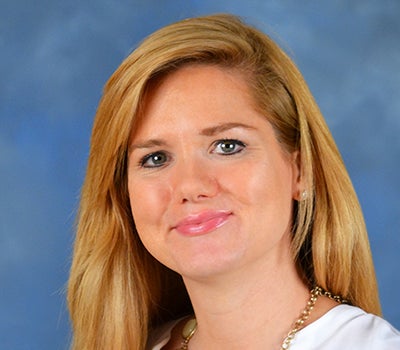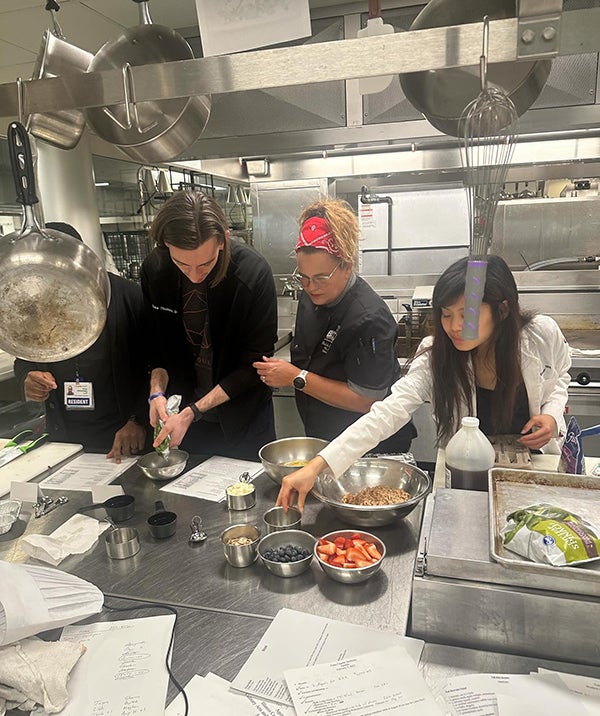The Importance of Teaching Kitchens and Culinary Curriculum in Educating Family Medicine Residents
The Importance of Teaching Kitchens

As physicians we are entrusted not only with the diagnosis and treatment of disease but also with the promotion of health and prevention of illness. In recent years, the integration of teaching kitchens into the education of family medicine residents is proving to be an innovative approach in promoting nutrition education. Teaching kitchens are optimal environments for residents and students to learn about the preparation of healthy meals, the science of nutrition, and how these elements intersect with medical advice. This experiential learning method enhances the ability of residents to counsel patients on dietary choices, leading to better patient outcomes.
The relationship between chronic diseases and nutrition is well documented. Poor dietary habits are major contributors to the development and progression of chronic conditions such as obesity, diabetes, cardiovascular diseases and certain cancers. A diet high in processed foods, sugars, and unhealthy fats can lead to inflammation, insulin resistance, and other metabolic disruptions that pave the way for these diseases. Although there is a critical role of nutrition in preventing and managing chronic diseases, most medical schools allocate minimal time to the subject. A 2023 qualitative study highlighted that many medical students feel ill-prepared to provide nutritional counseling, citing the limited scope and duration of their training. Research reveals that less than 20 hours of nutrition education is typically offered during medical school, which is insufficient given the complex dietary needs of patients. This gap extends into many residency programs, where the emphasis on practical nutrition training remains minimal, leaving many physicians feeling unqualified to advise patients effectively on diet-related health issues.
What is a teaching kitchen

What is a Teaching Kitchen?
A teaching kitchen is a culinary facility used by multidisciplinary teams of dietitians, chefs, physicians, medical students and other medical professionals to teach nutrition skills. Usually, a nutrition topic will be taught and correlated to specific disease prevention or management. Cooking demonstrations take place, followed by opportunities for hands-on learning with knife skills, culinary tips, and meal preparation. Time is spent enjoying a meal together and reflecting on the preparation process and outcomes. Also, an emphasis is placed on the techniques of conveying nutritional information and recipe recommendations in the patient setting.
Culinary Curriculum in Peoria
Our family medicine residents at the University of Illinois College of Medicine Peoria, along with medical students, participate in quarterly afternoon sessions either at the Illinois Central College kitchen or OSF Saint Francis teaching kitchen to delve into nutritional instruction. Core topics are covered, including diabetes, hypertension, hyperlipidemia, women’s health, pediatric nutrition, cardiovascular disease and food allergies. Three sessions are devoted to eating on a budget and addressing local resources and tips to maximizing nutrition with limited resources to address food insecurity. Also, a focus is placed on motivational interviewing and how to engage our patients in self-care. Last of all, residents and students are asked to reflect on their own health practices, and how this insight can be passed along when counseling their own patients.
Hurdles to Overcome
Despite the multiple benefits of teaching kitchens, there are several limitations and barriers to the widespread implementation. One major challenge is the financial cost associated with setting up and maintaining these facilities. High-quality ingredients, kitchen equipment, and the need for trained culinary instructors contribute to significant expenses. Additionally, integrating a culinary curriculum into an already packed medical education schedule can be challenging and takes commitment on the part of faculty and residents.
National Focus on Nutrition
The 2023, the ACGME Summit on Medical Education in Nutrition emphasized the important need to integrate comprehensive nutrition education into the training of medical students, residents, and fellows. Held in collaboration with the Association of American Medical Colleges (AAMC) and the American Association of Colleges of Osteopathic Medicine (AACOM), the summit included physicians, nutritionists, dietitians, and medical educators. The discussions focused on strategies to enhance the confidence and competence of medical professionals in addressing nutrition-related issues during patient care. The summit wrapped up with a call to action for embedding nutrition education throughout the medical education continuum, reflecting a commitment to the “Food Is Medicine” initiative.
In September of 2022, the White House Conference on Hunger, Nutrition, and Health took place — the first of its kind in over 50 years. A National Strategy was released with five pillars: improving food access and affordability, integrating nutrition and health, empowering all consumers to make and have access to healthy choices, supporting physical activity for all, and enhancing nutrition and food security research.
In conclusion, the integrating of teaching kitchens and culinary curricula into the education of family medicine residents and students is a vital step toward building skills among future physicians. As evidenced by both the 2023 ACGME Summit and the White House Conference on Hunger, Nutrition, and Health, there is a growing recognition of the crucial role that nutrition plays in preventing and managing chronic diseases. By providing hands-on experiences that bridge the gap between theoretical knowledge and practical application, teaching kitchens empower residents to confidently engage in meaningful dietary conversations with their patients. By equipping family medicine practitioners with these tools, we not only enhance individual patient care but also contribute to a broader societal commitment to health and wellness.
About the Author
Dr. Jolyne Kaar is a Clinical Assistant Professor in the Department of Family & Community Medicine. Dr. Kaar leads the Culinary Medicine Curriculum for the Family Medicine Residency Program.